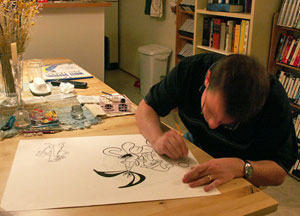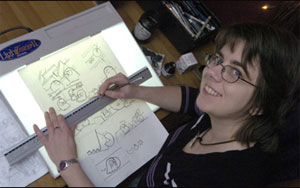Illustrator
Tasks & duties

Illustrators may do some or all of the following:
-
discuss the client's requirements
-
research the subject area for reference material
-
work out budgets and give quotes
-
discuss the ideas and layout of drawings with clients
-
do sketches of work
-
show sketches to the client
-
make necessary changes and draw the final artwork
-
give the final artwork to the client
-
keep a portfolio of work
Specialisations
Areas illustrators can specialise in include:
-
books
-
computer graphics
-
merchandising
-
advertising
-
corporate work
-
multimedia
-
fashion
-
medical illustration
Skills & knowledge

Illustrators need to have:
-
excellent drawing and artistic skills to convey ideas through facts and emotions
-
knowledge of drawing and art techniques such as drawing subjects from different viewpoints
-
an understanding of the effects of different art mediums such as watercolour paints, acrylics or coloured pencils
-
familiarity with drawing and art equipment
-
knowledge of the subject being illustrated
-
computer skills, for doing computer-based artwork
-
good communication skills
-
organisational, planning and time management skills
-
research skills
Entry requirements
To become an illustrator you must be able to show a talent for illustration. If you have no published work, you should put together a portfolio of illustrations showcasing your ideas and style so propsective employers can see what you can do.
Some employers may prefer you to have a formal art qualification, such as a diploma, degree or postgraduate degree in fine arts or design, although for most illustrators this is not absolutely necessary.
Secondary education
There are no specific secondary education requirements, but art, computer studies, graphic design, maths and English are useful. A tertiary entrance qualification is required to enter further training.
Tertiary education
Many illustrators have a Bachelor of Design majoring in visual communication. Other useful subjects include fine art, printmaking and fashion.
Training on the job
Illustrators develop their skills on the job. Some illustrators may attend art classes and seminars to enhance their skills.
Illustrators may also keep up to date with new trends and techniques in their industry by studying what other illustrators are doing. This can be done by reading other illustrators' blogs and websites, or subscribing to magazines with the latest styles and industry news.
Useful experience
Useful experience for illustrators includes:
-
sketching, painting and drawing
-
cartooning and animation work
-
any artistic or creative work
-
art or design courses
-
working in an office where they have used organisation and administration skills
-
teaching or any work in the subject areas they are illustrating
-
advertising or graphic design work
A course in business studies could also be useful for illustrators planning to run their own business.
Related courses
Computer Graphics
Fine Arts
Graphic Arts and Design Studies
For more information, please refer to Career Services.
Document Actions
